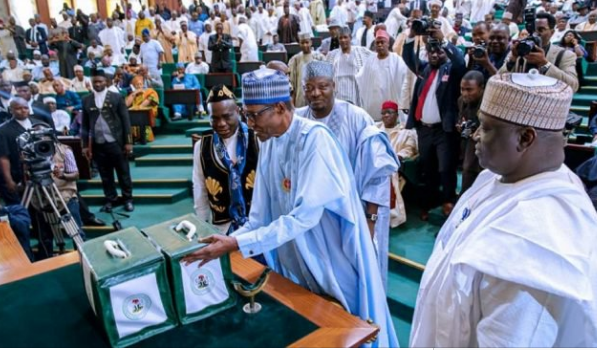“A Bill for an Act to Amend the Appropriations Act, 2020 to Authorize the issue from the Consolidated Revenue Fund of the Federation the total sum of N10,509,654,033,053 (N10.5 trillion naira) has passed second reading.”
This is according to the official Twitter Account of the House of Representatives of the Federal Republic of Nigeria in a tweet on Thursday.
The Federal Government had revised its 2020 budget downward following the economic downturn as a result of Covid-19 pandemic.
The 2020 budget oil price benchmark, has been revised three times following the crash in oil prices as demand slumped, due to the halt of economic activities around the world, resulting from the restrictions imposed to curtail the virus outbreak.
The 2020 budget was revised down to N10.51 trillion from N10.59 trillion in May 2020. The revision saw the initial crude oil benchmark of $57 per barrel drop to $30 per barrel and finally settled at $25 per barrel at the moment.
Read also; Nigeria Headed for a Deeper Recession, to Shrink by 8.9%: Finance Minister
The revised budget N10.5 trillion 2020 budget was sent to the house for an approval. The speaker of the House also read a letter of communication from President Muhammadu Buhari, seeking approval for the revised 2020-2022 Mid-Term Expenditure Framework (MTEF) as “it is necessary due to the sharp cut in the global oil price as well as drop-in local oil production.”
Statutory Transfers – “Out of the N10.52 trillion naira, N398,505,979,362 (Three Hundred and Ninety Eight Billion, Five Hundred and Five Million, Nine Hundred and Seventy-Nine Thousand, Three Hundred and Sixty-Two Naira) only, is for statutory transfer”
Debt Service – “N2,951,710,000,000 (Two Trillion, Nine Hundred and Fifty-One Billion, Seven Hundred and Ten Million Naira) only, is for debt service”
To put this in perspective, Nigeria will use 28.06% of its 2020 budget for debt servicing alone. This amount is projected to increase as the government continues to borrow. Investogist reported earlier today, that the Federal Government had sent a letter to House of Representatives requesting approval for a new loan.
Read also; FG seeks approval for new $5.51 billion loan
While N2,951,710,000,000 (Two Trillion, Nine Hundred and Fifty-One Billion, Seven Hundred and Ten Million Naira) only, is for Debt Service.
— House of Reps NGR (@HouseNGR) May 28, 2020
Recurrent expenditure – a total of N4,928,525,467,849 (Four Trillion, Nine Hundred and Twenty- Eight Billion, Five Hundred and Twenty-Five Million, Four Hundred and Sixty-Seven Thousand, Eight Hundred and Forty-Nine Naira) only, is budgeted for recurrent expenditure (Non-Debt Expenditure).
This means that 46.85% of the total budget is for recurrent expenditure. These are are not assets, they are expenditures that occur repeatedly or periodically, such as food, salaries and pensions, allowances, fuel for cars, etc.
Capital Expenditure – the sum of N2,230,912,585,842 (Two Trillion, Two Hundred & Thirty Billion, Nine Hundred & Twelve Million, Five Hundred & Eighty – Five Thousand, Eight Hundred and Forty-Two Naira) only, is for contribution to the Development Fund for Capital Expenditure.
Read further; CBN Monetary Policy Committee Cuts Policy Rate to 12.5%
Capital expenditure is mainly an investment in assets that are used to provide goods and services to the people. This will include the provision of ports, roads, schools, industries, hospitals, rails etc. The economic value of capital expenditure last over a long period.
Written by
Ifunanya Ikueze




















































